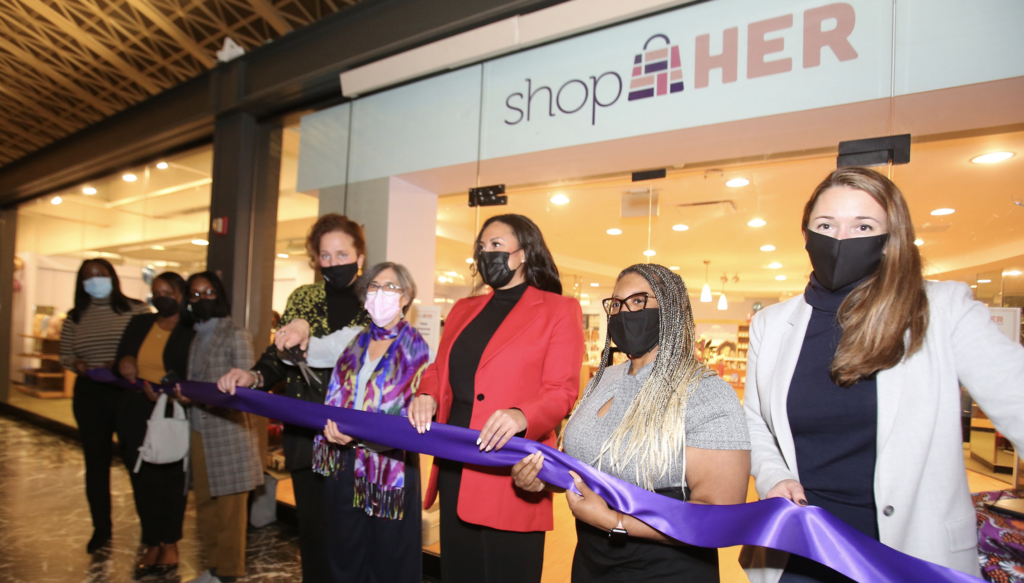Two Women’s Business Centers Create a Collective Opportunity

By Lisa Abelar
Lisawritesaboutit@gmail.com
It isn’t often that 4,000 square feet of retail space becomes available in one of the historically busiest transportation hubs in Washington, DC. And it isn’t often that a space like that could provide an avenue for resiliency and growth for local, women-owned businesses.
But, just as the COVID-19 pandemic created challenges, it too created opportunities.
Heidi Sheppard, Project Director at Washington, DC’s Women’s Business Center and Morgan Wortham, Managing Director at Maryland’s Women’s Business Center, saw potential in one of the many retail vacancies at Union Station. And both women recognized it as an opportunity to directly help women-owned businesses recover and thrive after suffering pandemic-induced losses.
“We aren’t just giving webinars or theoretically giving people information,” Sheppard said. “We are directly helping these entrepreneurs recoup their financial losses due to COVID. And as an incubator program, we are providing counseling and training to help them through this challenging recovery phase.”
That points to the fact that ShopHER, a pop-up retail space and incubator for women-owned businesses inside Union Station, has already experienced the success it was designed to achieve. These small retail businesses were able to generate greater revenues during the busy holiday season, something that wouldn’t have happened without ShopHER.
A collaborative effort between the two WBCs, the U.S. Small Business Administration, the National Community Reinvestment Coalition, Union Station and Ashkenazy Realty, ShopHER is a collective of 17 regional entrepreneurs who are making the most of the increased visibility the storefront affords.
“I can not get enough of the collective we have,” Tosca Metz, owner of T & U Mongolian Cashmere, said of being part of the ShopHER pop-up. “Everybody understands each other, because we’re all women and moms and have other jobs. We understand our struggles. We help each other out constantly.”
That sense of community is a tertiary but welcome benefit of the ShopHER marketplace, which is supported by funds allocated through the CARES Act, an economic stimulus bill introduced in response to the pandemic. The grant means the women business owners, who are primarily minorities, have very little overhead.
“Basically, all the revenue they’re making is profit,” Sheppard said, noting that ShopHER features women business owners from Ethiopia, Uzbekistan, Indonesia, Mongolia, England, Venezuela and the U.S. “One of the things I find particularly heartwarming is that they are reflective of the demographic diversity of D.C. This is the face of D.C. right now and it’s something to be really proud of and support.”
ShopHER took over a space that had been vacant for a year following the closure of a men’s clothing store, which meant it needed some work. It needed to be cleaned, it needed WiFi, it needed new paint, branding, signage and updated electrical work. The women were able to utilize some of the furnishings left behind by the previous retailer, and Metz — who had a storefront for her retail shop before it closed during the pandemic — filled in some of the gaps by bringing over speakers and boxes and bags to get the operation up and running.
“It definitely brought my designs and spread the word about my work into different populations and different economic groups,” Metz said of the benefits she’s experienced as a ShopHER participant. “Since I’m not paying rent, I don’t have to mark up the price as much, so that definitely helps make my work more relatable.”
Winta Teferi and Tensae Haile, childhood friends from Ethiopia, seized an opportunity with ShopHER to focus exclusively on the business they had previously only had time to nurture on a part-time basis since opening it in 2017. Kelem, a shop devoted to Ethiopian-made goods, is facilitating a trickle-through effect by supporting its owners but also supporting the Ethiopian makers, who have also struggled through COVID.
“The thing is, especially now with COVID and the war, a lot of tourists are not coming into Ethiopia,” Haile said. “This definitely helps them.”
For Teferi, she appreciates that ShopHER allows her and Haile to step up to exploring their own storefront some day, while receiving valuable guidance and training as part of a cooperative market. ShopHER essentially allows the women to ease into a live retail environment while learning the ropes along the way.
“It doesn’t get any better. It’s the perfect arrangement. And, we have this institutional support,” Teferi said of the ShopHER experience. “As difficult as the pandemic has been, the silver lining is it somehow created a pathway for us to focus and do what we’ve always wanted to do. We have to make this thing work because we don’t want to go back to our 9 to 5.”
And to make ShopHER work long term, it will require additional funding. The CARES Act grant runs out at the end of April, a date Sheppard and Wortham are acutely aware of. Sheppard, who consistently calls the women entrepreneurs involved with ShopHER “amazing,” said the project could continue for another year if it was able to secure at least $75,000 in financial support.
If they don’t secure the funding, Sheppard said she and the women entrepreneurs could be devastated, especially since she’s seen the wealth of positive benefits from it first hand.
“A lot of businesses closed at Union Station and we are like a shining light on the second floor where there are few spaces that are still open. And we’re at the top of the stairs and we’re visible and it has brightened up and helped Union Station,” Sheppard said. “If we go dark again, it will have a ripple effect.”
One of the hardest hit sectors during the pandemic was retail, an industry supported extensively by women and women entrepreneurs. For Sheppard, ShopHER just makes sense.
“We’ve invested a lot of money, time, energy and love into this space and it looks amazing. Why should we stop? It’s amazing,” she said.






[…] Featured on the Association of Women’s Business Centers (AWBC) Blog […]